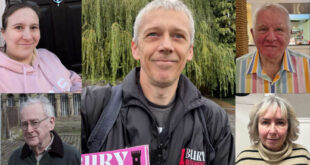Some of the less frequently recognised heroes of lockdown have been our postal staff. Here, Stratford resident MANYA CHADWICK pays tribute to her postie, Matt Shadbolt, with the amazing story of the rediscovery of her mother’s lost letters.
A WEEK ago, I was eagerly awaiting two envelopes that should have arrived several days before.
My cousin in Devon had found letters my mother had written to her parents from 1944 to 1967. The letters were of great sentimental value and my cousin wanted me to have them.
Mum had been a 20-year-old English war bride who married a handsome Canadian soldier in May 1945, two days after the end of World War II. As her husband felt he could make a far better living in Canada than in post-war Britain, she agreed to emigrate, although it was a terrible wrench to move an ocean away from the family she loved.
She went on to have five children and each week wrote back to England. Growing up in Canada, I hardly knew my English family except through photos and the letters Mum read to us. Every week she wrote to them until her untimely death in 1967, shortly before my thirteenth birthday.
Back in England, my mother’s family cherished her letters. She was a gifted writer and a keen observer. Her letters were lively, full of colourful news about her children, friends, work and leisure, important national events as well as her deep thoughts about life’s challenges.
A fortnight ago, my cousin mailed two fat envelopes a few days apart. More than a week passed and neither had arrived. Unfortunately, she hadn’t tracked them or written her return address, nor had she written my family name as I had recently remarried. Then we discovered she had written the wrong house number: the envelopes were sent to number 23, not 24. That house was on a different branch of our road.
My husband ran to find number 23. The elderly couple there had received one fat envelope, which they opened, hoping to find the sender’s information. It wasn’t there. Not knowing what else to do, they taped the envelope up, marked it “unknown/return to sender” and reposted it only a day or two before.
Tears sprang to my eyes. Our postman might have found me on a second try if the envelope had shown my family name, but not with my first name alone and the wrong house number.
I called my cousin to tell her. She was aghast and desperately sorry.
Not willing to give up, I searched for a Royal Mail enquiries number. I told my story to a sympathetic lady who gave me a case number. However, she warned me that undeliverable items end up at the Belfast facility to be destroyed. I couldn’t bear the idea.
Given that the couple at number 23 had reposted one envelope two days earlier and the other had not shown up, they might still be at Stratford’s delivery office in Maybrook Road. I arrived at enquiries only to find it closed on Wednesdays.
I then saw a man loading his van with mail. I explained the situation and wondered if he could please find the person who delivered to our street. He gladly popped back into the building. That’s when our postman Matt emerged – I had never seen him. He listened attentively then ran back in to see if anything of that description had been returned.
Matt soon emerged, waving one misaddressed envelope. I tore it open and excitedly showed him the first letter, dated 1944. Smiling, he said he would keep an eye out for the second envelope. I went home, full of hope.
A day passed – nothing. But early the following morning, a Royal Mail van drew up and a big fat envelope popped through our letterbox. Matt had written on the envelope: “I hope this is what you were waiting for.”
Indeed it was. Sadly, he was gone before I could thank him.
That day, my husband and I spent hours reading those letters. He explained the Second World War terminology Mum had used, words such as doodlebug – Nazi Germany’s V-1 flying bomb – and VAD – Voluntary Aid Detachment, or voluntary nurses caring for military personnel.
I had not realised that my mother had been living in Croydon, one of the most heavily bombed parts of England. I was moved to read her joyful account of becoming engaged to my father at the end of the war.
These letters gave me a wonderful picture of my mother as a young woman, brimming with excitement about her future.
I wanted to tell Matt the joy he had brought. I watched for him the next morning and leaped to the door to thank him. Matt had gone far beyond the call of duty to make that special delivery. Thank you, Matt. You’re my hero.
Matt told the Herald: “To be able to help was brilliant and I really appreciate all the thanks from people.
“I was just doing my job and it was a good feeling to bring back something so special and treasured.
“Given the circumstances in the world right now, any good news is welcomed.
“I would also just like to thank all the residents for all their support over the last 12 months.”
Source link



